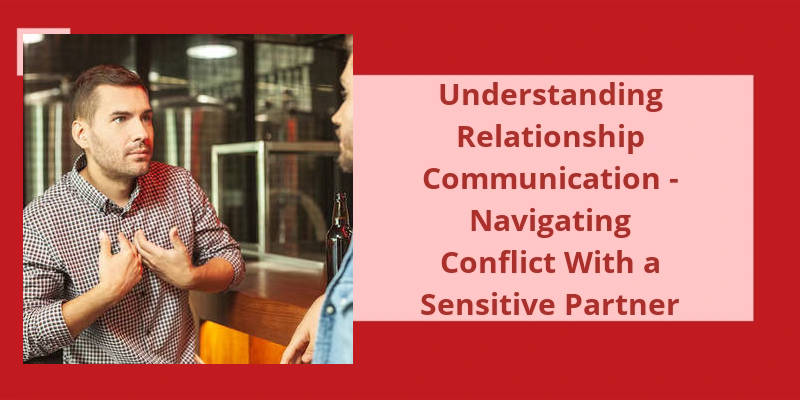Understanding Relationship Communication: Navigating Conflict With a Sensitive Partner. In every relationship, it’s natural for conflicts and issues to arise. Whether it be differences in opinions, expectations, or simply misunderstandings, engaging in open and honest communication is crucial for maintaining a healthy and thriving relationship. However, when you’ve a sensitive partner who becomes easily upset or angered when you bring up issues, it can be challenging to navigate these conflicts effectively. Feeling as though your concerns are dismissed, ignored, or met with defensiveness can leave you feeling frustrated and unheard. Therefore, it’s essential to develop a deep understanding of your sensitive partner's communication style and find productive ways to address concerns without exacerbating their emotions. By learning strategies for effective communication and implementing empathy and patience, you can create an environment where both you and your partner feel comfortable addressing issues and working through conflicts together.
Why Does My Boyfriend Get So Mad When I Ask Questions?
Understanding Relationship Communication: Navigating Conflict With a Sensitive Partner
Have you ever wondered why your boyfriend becomes so furious whenever you ask him a simple question? It can be incredibly frustrating and confusing, leaving you feeling hurt and unsure about his intentions. However, this kind of reaction often speaks volumes about his own sensitivity and trust issues.
When your boyfriend gets mad at the questions you pose, it could be a reflection of his own insecurities and fear of judgment. Perhaps he’s worried that you’re accusing him of being unfaithful or hiding something from you. These negative assumptions may stem from past experiences in his relationships that have left him feeling vulnerable and guarded.
Creating a foundation of trust and open communication is crucial. It’s essential to provide your sensitive partner with the time and space needed to develop a sense of security in your relationship. Understand that his anger may be a defense mechanism triggered by past wounds, and it takes patience and understanding to unravel those layers of resentment.
Building trust requires consistent reassurance and demonstrating your commitment to understanding his emotions. Encourage your boyfriend to express his concerns and fears without judgment, and actively listen to his perspective. It’s vital to validate his feelings and assure him that your intentions are genuine and rooted in love and care.
While it may feel challenging and even unfair at times, remember that navigating conflicts with a sensitive partner can lead to a deeper level of understanding and connection in your relationship. By being mindful of his past experiences and allowing him the time and space to heal, you’re laying the groundwork for healthier communication patterns.
Ultimately, it’s important to view his anger not as an attack on you, but rather as a manifestation of his own emotional baggage. By approaching these situations with empathy and compassion, you can work through the challenges together, fostering a stronger and more resilient bond.
How to Set Boundaries and Address Anger in a Relationship
- Communicate openly and honestly with your partner about your feelings and needs.
- Identify and establish your personal boundaries within the relationship.
- Discuss and negotiate boundaries with your partner, ensuring that both parties are comfortable and satisfied.
- Develop effective anger management techniques such as deep breathing, mindfulness, or seeking professional help.
- Practice active listening and empathy when your partner expresses anger or frustration.
- Avoid blame or criticism and instead focus on problem-solving and finding common ground.
- Take breaks or time-outs during heated arguments to cool down and gain perspective.
- Seek counseling or couples therapy if communication and anger issues persist.
It’s important to understand that everyone has their own communication style and coping mechanisms when faced with difficult conversations, and anger may be your boyfriend’s way of exerting control and avoiding vulnerability. However, it’s crucial to address this pattern of behavior and find healthier ways to express concerns and resolve conflicts within your relationship.
Why Does My Boyfriend Get Angry When I Confront Him?
Communication plays a crucial role in any relationship, including romantic partnerships. However, it isn’t uncommon for some individuals to respond with anger when confronted or approached about uncomfortable subjects. If you find that your boyfriend gets angry when you try to discuss certain topics, it could stem from a variety of reasons.
Another reason for his anger could be that he feels pressured to compromise or conform. Your attempts to address issues may inadvertently put your boyfriend in a position where he feels his own wants or needs are being dismissed or invalidated. As a result, he becomes defensive and responds with anger to assert his own independence or boundaries.
Traumatic experiences, past relationship dynamics, or unresolved emotional baggage can all impact an individuals ability to handle conflicts in a healthy manner. It’s essential to approach these situations with empathy and understanding, as it could be indicative of deeper emotional wounds that need healing.
In these situations, it’s important to approach the conversation with empathy and understanding. Letting your boyfriend know that you want to create a safe space for open communication can help break down those defensive walls. By addressing the underlying issues and working together to improve communication, you can foster a healthier and more trusting relationship.
Why Does My Boyfriend Get Defensive When I Confront Him?
Understanding Relationship Communication: Navigating Conflict With a Sensitive Partner
In any relationship, it’s crucial to establish effective communication channels to navigate conflicts successfully. However, it can be disheartening when your boyfriend consistently responds defensively whenever confronted about issues. It’s important to recognize that defensive reactions often stem from feelings of being attacked or misunderstood. When individuals feel judged or criticized, they may instinctively put up walls to protect themselves.
If your partner regularly becomes defensive when you confront him, it may be beneficial to have an open and honest conversation about it. Avoid approaching the situation with accusatory language or a confrontational tone, as this can further escalate defensiveness. Instead, express your concern and desire for better communication, emphasizing your intention to understand each others perspectives.
Creating a safe and nonjudgmental environment is crucial when addressing sensitive topics. If your partner feels comfortable and validated in expressing his thoughts and emotions without fear of judgment, defensiveness may diminish. Actively listen to his concerns, acknowledging his feelings and seeking to understand his point of view. Assure him that you value his input and that this conversation is a way to strengthen your connection.
It’s essential to remember that defensiveness is often a defense mechanism triggered by a sense of insecurity. By fostering a supportive atmosphere, you can help your partner feel more secure in expressing himself without fear of negative repercussions. Avoid reacting defensively yourself when he raises concerns or critiques. Instead, strive for empathy and validation, facilitating a productive dialogue.
Lastly, encourage open communication and compromise when resolving conflicts. Help your partner feel heard and understood by actively engaging in problem-solving rather than resorting to blame or defensiveness. By approaching conflicts as a team, you can work together to find mutually beneficial solutions that address both your needs.
By fostering a safe and nonjudgmental environment, actively listening, validating his feelings, and approaching conflicts as a team, you can enhance your communication and navigate conflicts more effectively. Remember that building a strong foundation of trust and understanding is key to fostering a healthy relationship.
Communication Techniques for Addressing Difficult Topics With Your Boyfriend
In order to address difficult topics with your boyfriend, it’s important to practice effective communication techniques. Start by choosing the right time and place to have the conversation, ensuring that both of you’re in a calm and relaxed state of mind. It can also be helpful to use “I” statements to express your feelings and thoughts, as this helps to avoid blaming or attacking your partner.
Active listening is crucial during these conversations. Give your boyfriend your full attention, maintain eye contact, and show empathy by acknowledging his emotions. Encourage him to share his perspective and actively listen to understand his point of view.
Avoid becoming defensive or reactive when disagreements arise. Instead, focus on finding common ground and understanding each other’s needs and concerns. Use constructive language to express your thoughts and feelings, and be open to finding compromise.
Remember, communication is a two-way street, so allow your boyfriend the opportunity to express himself as well. By approaching difficult topics with empathy, active listening, and open-mindedness, you can navigate conflict in your relationship and strengthen your bond with a sensitive partner.
This can create a communication barrier between both partners, leading to frustration and the potential for explosive reactions. Understanding the underlying reasons behind your husband’s anger can help you find effective strategies to improve communication and build a healthier relationship.
Why Does My Husband Get So Angry When I Ask Him a Question?
Communication is a crucial aspect of any relationship, and it isn’t uncommon for couples to experience conflicts in this area. However, it can be particularly challenging when one partner becomes angry or defensive when asked questions. If you find yourself wondering why your husband gets so angry when you ask him a question, it may be helpful to consider a few potential reasons.
Firstly, it’s important to recognize that everyone has different communication styles and preferences. Some individuals may feel more comfortable with open and direct communication, while others may prefer to share information voluntarily.
It’s also worth considering the tone and manner in which you ask your questions. Sometimes, the way a question is posed can inadvertently convey criticism, judgment, or a lack of understanding.
It’s common for couples to experience communication issues within their relationship. However, when your husband responds with anger when you try to talk to him, it might be a sign of deeper underlying problems. It’s important to reflect on your own feelings of satisfaction in the relationship and consider exploring the root causes of his anger.
Why Does My Husband Get Angry When I Try to Talk to Him?
When the relationship loses it’s quality, partners often react in various ways, and it can be perplexing when your husband becomes angry when you try to communicate with him. One possible explanation for his anger is that he feels he’s lost something significant within the relationship, yet he may not fully understand what it is. Understanding the root cause of his anger requires self-reflection and an examination of your overall satisfaction with the relationship.
Take a moment to assess your own level of contentment in the relationship. Are there any unresolved issues or neglected needs that could be contributing to the breakdown in communication? It’s crucial to remember that relationships are a two-way street, and both partners play a role in maintaining the quality of communication. Perhaps there’s been a disconnect lately, leading to your husbands emotional reactions.
When approaching your husband about these concerns, it’s essential to frame the conversation in a way that’s non-confrontational and non-accusatory. Express your desire to understand his feelings and find common ground to work on improving the relationship together. By fostering an environment of empathy and open communication, you can create a safe space for both of you to express your needs and concerns.
Additionally, it’s crucial to validate your husbands emotions, even if they appear negative or come across as anger. Emotions are often a response to underlying unmet needs or unresolved issues, and acknowledging his feelings can help build trust. Encourage him to express himself in a healthy and constructive manner, ensuring that both of you actively listen and validate each others perspectives.
Lastly, seeking professional help, such as couples therapy or counseling, can be highly beneficial in navigating conflicts within the relationship. A neutral third party can provide guidance and tools to improve communication, enhance understanding, and address the deeper issues at hand. It’s important to approach therapy with an open mind, willingness to grow, and a commitment to work together towards a healthier relationship.
Remember, effectively navigating conflict with a sensitive partner requires patience, understanding, and open lines of communication. By actively seeking to understand each others needs and addressing underlying issues, you can begin to rebuild trust and strengthen the bond within your relationship.
How to Set Boundaries in a Relationship to Prevent Anger and Conflict
Setting boundaries in a relationship is crucial for preventing anger and conflict, especially when you’ve a sensitive partner. It involves clear communication and understanding each other’s needs, limits, and expectations.
Start by having open and honest conversations about your respective boundaries. This means discussing what makes you uncomfortable, what triggers anger or conflict, and how you can navigate these situations together.
It’s essential to establish boundaries that respect both individuals’ emotions and values. This might involve defining personal space and alone time, agreeing on acceptable behavior during disagreements, and discussing what support looks like in times of conflict.
Remember that setting boundaries isn’t about controlling or restricting your partner. It’s about fostering a safe and healthy environment where both partners can express themselves and feel understood.
Practice active listening and empathy when your partner shares their needs and boundaries. Validate their feelings and work together to find compromises that honor both individuals’ emotions and well-being.
Lastly, consistently reinforce these boundaries by respecting them and holding each other accountable. This will help establish trust and create a solid foundation for dealing with conflicts and anger in a more constructive and peaceful manner.
It’s essential to address the issue of your boyfriend’s reaction when you express your feelings. While discomfort or anger may stem from a mismatch of emotions, it’s crucial to have an open and honest conversation about his true feelings towards you. By discussing the topic and encouraging him to express his emotions, you can better understand where both of you stand in terms of love and affection. However, if he’s unable to communicate or continues to exhibit anger, it may be a sign that his feelings towards you aren’t genuine.
Why Does My Boyfriend Get Mad When I Express My Feelings?
“Why does my boyfriend get mad when I express my feelings?”. This is a common concern shared by many individuals in relationships. It’s important to understand that everyone has different ways of expressing and processing their emotions. Your boyfriends reaction could be due to various reasons, such as personal experiences, upbringing, or communication style.
One possibility is that your boyfriend may not feel the same way as you do, which can make him uncomfortable or defensive. It’s possible that he struggles with emotions and finds it challenging to connect with his own feelings, let alone validate and acknowledge yours. This might lead to frustration and anger as a defense mechanism to avoid facing his own emotions.
It’s crucial to have open and honest conversations with your boyfriend about your feelings and concerns. However, it’s important to approach the topic without accusation or blame. Instead, create a safe and non-threatening environment where both of you can express yourselves without fear of judgment or anger.
Try asking him to express precisely how he feels about you in terms of love and affection. It’s essential to understand his perspective and validate his emotions as well. If he can’t express himself or responds with anger, he may be indirectly telling you that he doesn’t feel the same way towards you. This could be a sign of mismatched emotional compatibility in the relationship.
It’s important to reflect on the overall dynamic of your relationship, considering factors like trust, communication, and emotional intimacy. If you havent been physically intimate with your boyfriend yet, it might be beneficial to take a step back and evaluate if the emotional connection is strong and healthy before moving forward.
Remember that every relationship is unique, and understanding and navigating communication can sometimes be a challenge. It may also be helpful to seek support from a couples therapist, who can provide guidance and facilitate a more productive and compassionate dialogue between you and your boyfriend.
How to Effectively Communicate With Your Partner About Your Feelings
Effective communication is a vital aspect of any relationship, particularly when it comes to expressing our feelings to a sensitive partner. Here are a few key tips to consider:
Firstly, it’s important to choose an appropriate time and place to have these conversations. Finding a quiet and comfortable setting where both partners can focus and listen with undivided attention can create an environment conducive to productive communication.
Next, use “I” statements when discussing your feelings. This helps avoid accusatory language and places the focus on your emotions and experiences. For example, instead of saying, “You always make me feel ignored,” try saying, “I feel ignored when I don’t receive a response to my messages.”
Active listening is another vital component of effective communication. This involves not only hearing what your partner says, but also understanding their perspective and validating their emotions. Reflecting back and summarizing what they’ve expressed can demonstrate your attentiveness and empathy.
It’s crucial to remain calm and composed during these conversations, even if tensions rise. Taking deep breaths, using “I” statements, and avoiding blame can help de-escalate potential conflicts and keep the dialogue open and respectful.
Lastly, be patient and understanding with your partner’s sensitivity. Recognize that their emotional responses may differ from yours, and try to approach the conversation with an empathetic mindset. This can foster a more supportive and compassionate connection.
Conclusion
It isn’t uncommon for a boyfriend to become upset or defensive when issues are brought up, highlighting the importance of approaching such conversations with empathy, compassion, and effective communication skills. By seeking to understand each other's perspectives, practicing active listening, and promoting open dialogue, couples can work towards resolving conflicts and strengthening their relationship. It’s vital to create a safe and non-judgmental environment where both partners feel heard and valued. Ultimately, fostering a deep understanding of one another's emotional needs and finding mutually beneficial solutions will contribute to a more fulfilling and resilient relationship.






